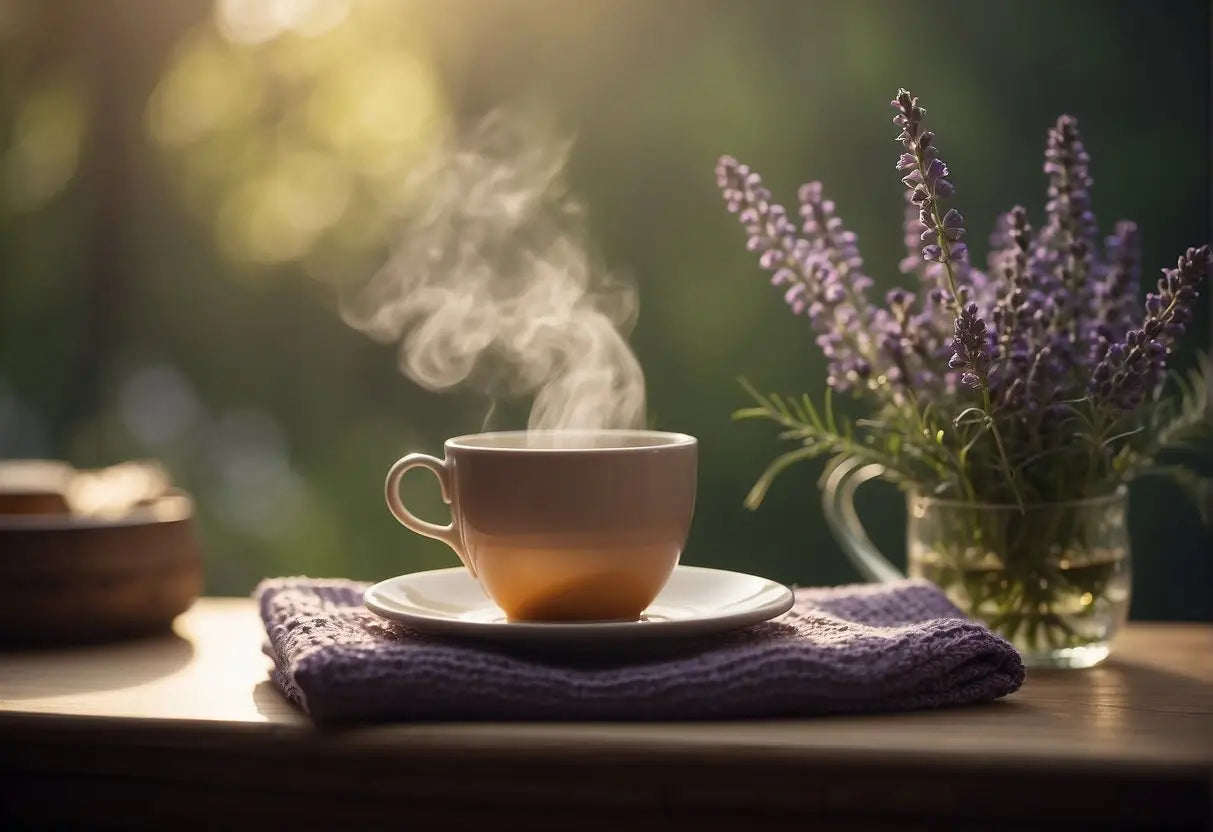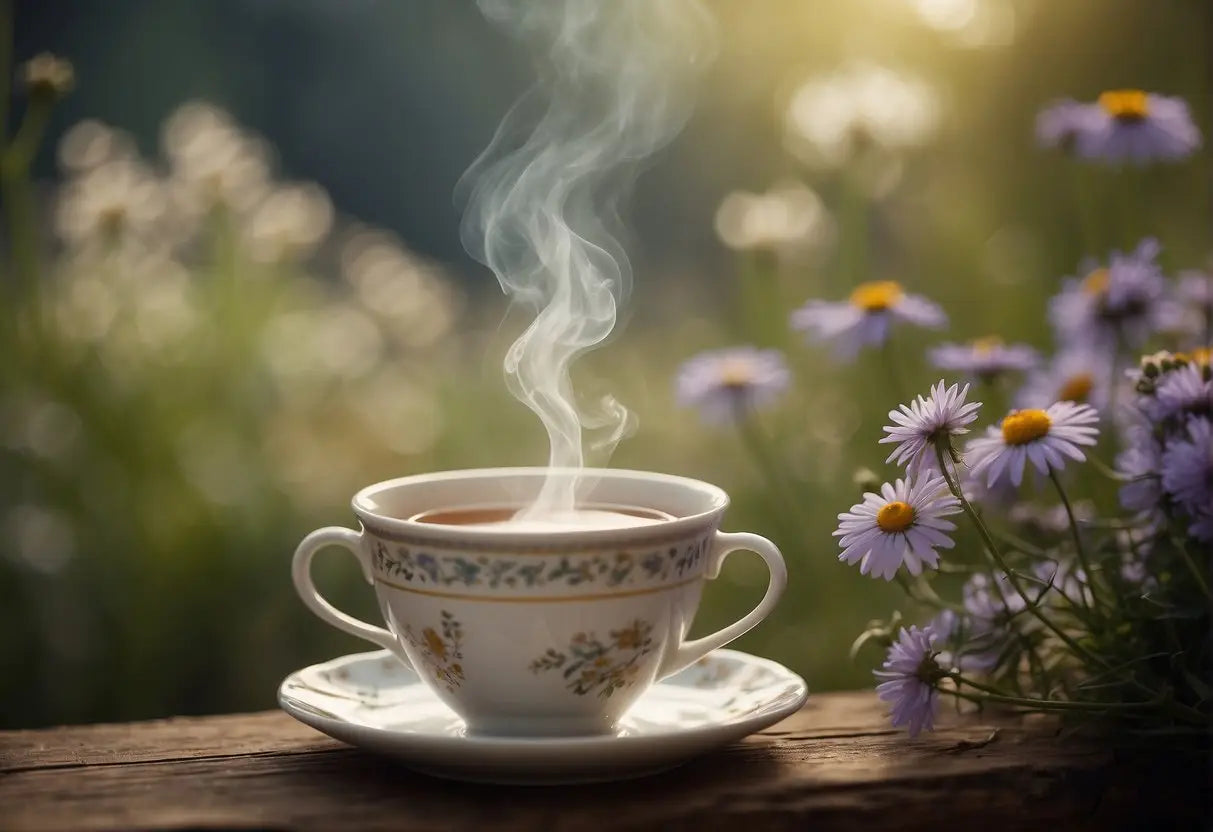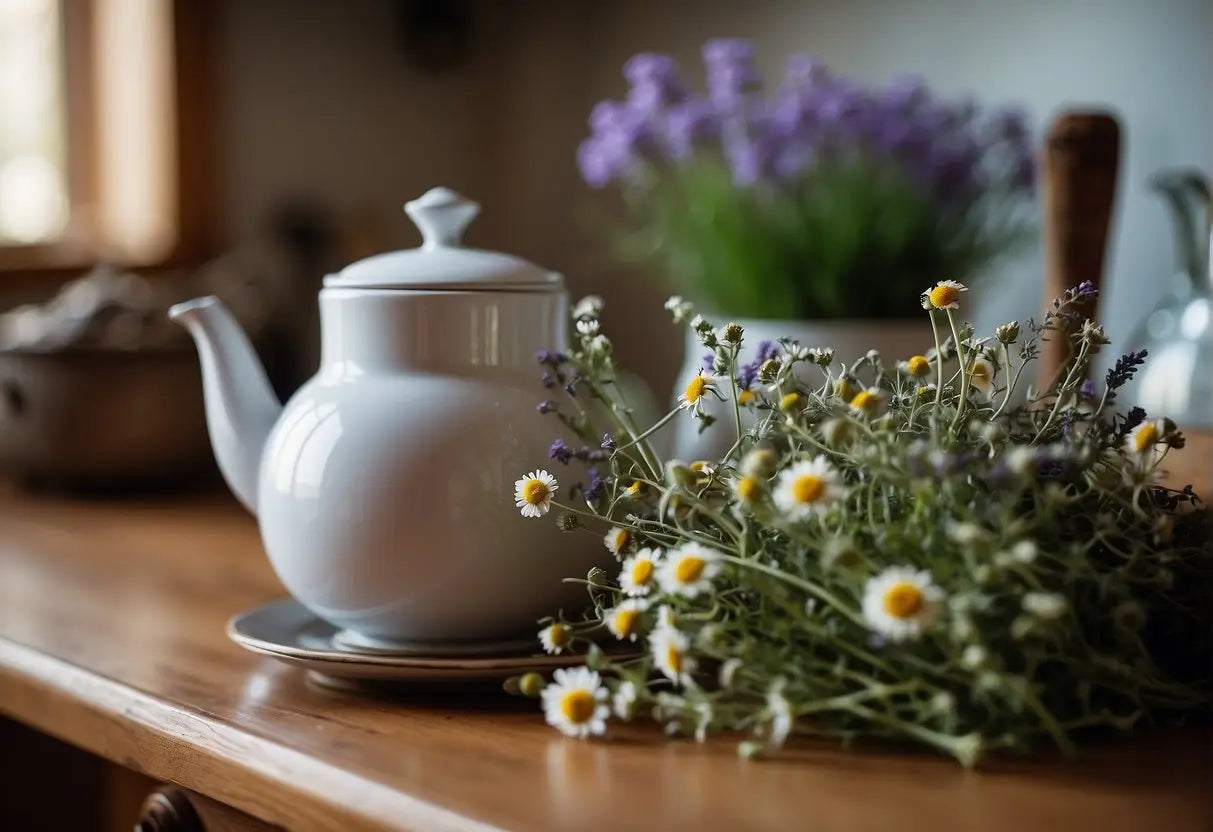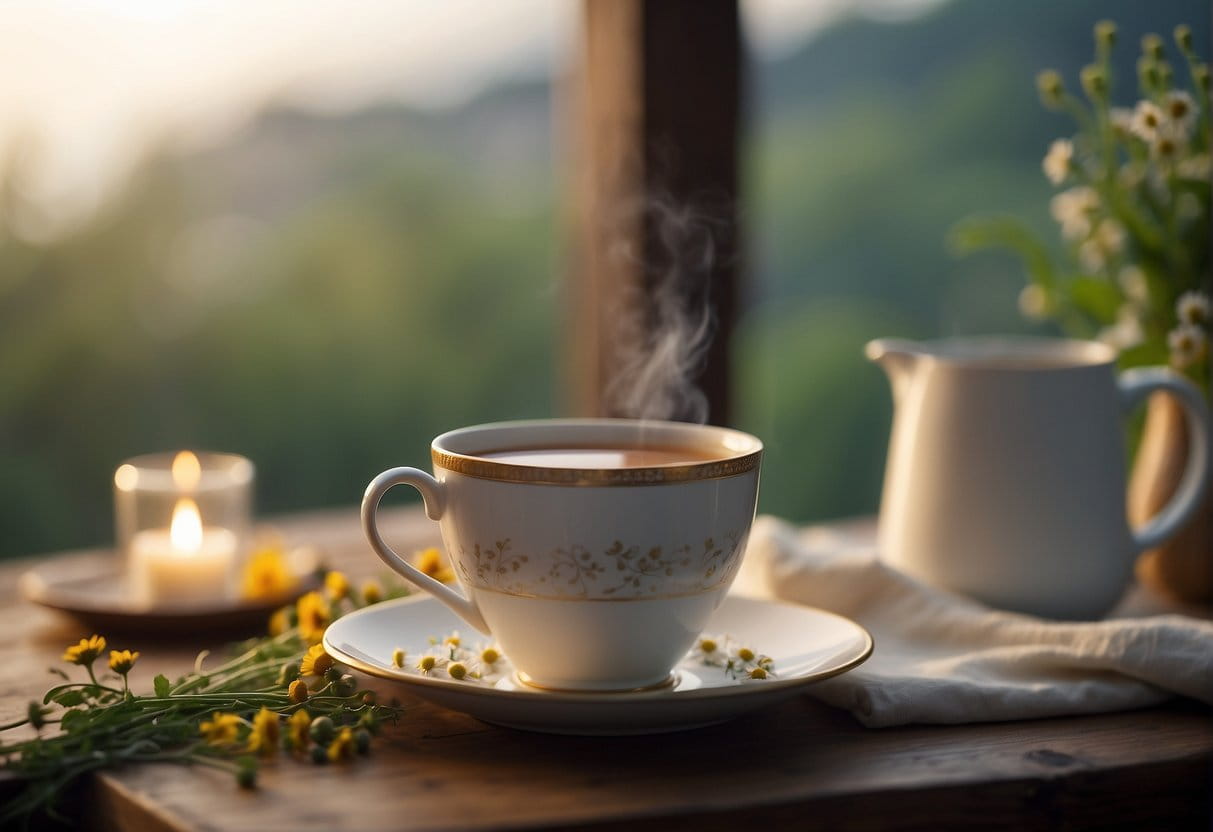What Tea is Good for Anxiety
In exploring the connection between tea and anxiety relief, it's important to understand how certain teas can influence stress levels and the variety of anxiety disorders they may alleviate.
The Role of Tea in Stress Relief
Tea contains several compounds that have a calming effect on your mind. Notably, L-theanine, an amino acid found primarily in green tea, can foster a state of relaxed alertness. Research suggests that L-theanine may help increase alpha brain waves, which are associated with a state of "awake relaxation." Coupled with a moderate amount of caffeine, which green tea provides, this can lead to improved focus alongside calmness.
| Compound | Found in | Potential Effect |
|---|---|---|
| L-theanine | Green Tea | Promotes relaxation without drowsiness |
| Caffeine | Various Teas | Can enhance alertness and focus |
In addition to L-theanine, teas like chamomile and valerian root tea contain properties that may soothe the nervous system and promote sleep. Chamomile is particularly rich in an antioxidant called apigenin, which binds to certain receptors in your brain that may decrease anxiety and initiate sleep.
Bestsellers

Types of Anxiety Disorders
Anxiety disorders vary widely, and while tea can be a beneficial part of a relaxation routine, it's important to recognize that tea is not a cure for anxiety disorders. When considering the spectrum of anxiety disorders, from Generalized Anxiety Disorder (GAD) to Panic Disorder or Social Anxiety Disorder, it's important to approach tea as a complementary strategy for managing symptoms.
-
Generalized Anxiety Disorder (GAD): You may experience persistent and excessive worry. Herbal teas like chamomile may be useful adjuncts to other treatments, helping to ease the tension.
-
Panic Disorder: If you have episodes of intense fear that peak within minutes, caffeine-free herbal teas might help create a sense of calm during or after panic attacks.
-
Social Anxiety Disorder: For the discomfort and fear in social situations, a warm cup of green tea might help soothe nerves due to L-theanine's relaxing properties.
Remember, while certain teas can help mitigate the symptoms of anxiety, they should be part of a broader treatment plan developed in consultation with healthcare professionals.
Top Teas for Anxiety

Select teas can significantly assist in managing anxiety thanks to their calming properties. Explore how chamomile, green tea, and various herbal teas serve this purpose.
Chamomile Tea Benefits
Chamomile tea is renowned for its calming effects on the nervous system. A natural sedative, chamomile contains apigenin, an antioxidant that binds to certain receptors in your brain that may decrease anxiety and initiate sleep.
Green Tea and L-Theanine
Green tea is more than just a refreshing beverage—it's a rich source of L-theanine, an amino acid known to promote relaxation. Studies suggest that L-theanine can help reduce stress levels and enhance your overall mood without causing drowsiness.
Herbal Teas and Anxiety
Herbal teas, such as valerian root and lavender, have been used for centuries to help with relaxation and anxiety reduction. While valerian root can reduce the amount of time it takes for you to fall asleep, lavender tea may lower anxiety levels and calm nervousness.
- Valerian Root: May improve the quality of sleep.
- Lavender: Known for its stress-reducing effects.
How Tea Affects the Nervous System

Lao Ban Zhang
Tea contains several compounds that interact with the nervous system, often producing a calming effect. The primary active ingredients you'll encounter in tea that are relevant to anxiety include L-theanine, caffeine, and herbal components.
L-theanine, an amino acid found in tea leaves, promotes relaxation without drowsiness. It aids in increasing the activity of the neurotransmitter GABA (gamma-aminobutyric acid), which has anti-anxiety effects. Additionally, L-theanine enhances levels of serotonin and dopamine, which can help improve your mood and sleep.
| Compound | Function in Nervous System | Effect on Anxiety |
|---|---|---|
| L-theanine | Increases GABA, serotonin, dopamine | Reduces anxiety |
| Caffeine | Blocks adenosine receptors | Can increase alertness |
| Herbal components | Varies by herb | May reduce anxiety |
Caffeine, on the other hand, is a stimulant that can increase alertness by blocking adenosine receptors in the brain. However, in larger amounts, caffeine can exacerbate anxiety symptoms. Therefore, moderation is key.
Many herbal teas, such as chamomile or peppermint, do not contain caffeine and are well known for their natural calming properties. Ingredients in herbal teas may affect neurotransmitter activity, providing an anti-anxiety benefit.
- Chamomile is widely regarded for its mild sedative effects due to the flavonoid apigenin.
- Peppermint can act as a muscle relaxant and may reduce symptoms of anxiety.
When you consume tea, pay attention to these ingredients and their potential effects on your nervous system to understand how they may help manage anxiety. Remember that everyone's body chemistry is different, and what works for one person may not work for another. It is also advisable to consult with a healthcare professional before making any significant changes to your diet or health regimen.
Preparing Tea for Anxiety Relief

When seeking to alleviate anxiety through tea, the two critical components to consider are how the tea is brewed and the most beneficial times for consumption.
Brewing Techniques
- Type of Tea: Start with herbal teas known for their calming properties, such as chamomile, lavender, or valerian root.
- Water Temperature: Use hot, but not boiling, water (around 208°F) to avoid burning the herbs, which can alter the soothing effects.
- Steeping Time: For optimal potency, steep your tea for about 5-10 minutes. Longer steeping releases more of the active compounds.
Optimal Times for Tea Consumption
- Morning Routine: Incorporate a cup of calming tea into your morning routine to start your day with a relaxed mindset.
- Stressful Events: 30 minutes before a known stress-inducing event, drink a cup of tea to help preempt anxiety.
- Evening Wind Down: A cup of tea in the evening can help signal to your body that it's time to relax and prepare for sleep.
Scientific Research on Tea and Anxiety
Multiple studies have shown that certain teas may have a calming effect on your nervous system.
L-Theanine, an amino acid found in tea leaves, is commonly associated with these effects. It has been found to promote relaxation without drowsiness. A study published in the Journal of Functional Foods in 2019 showed that L-Theanine can help reduce stress and anxiety in people exposed to stressful conditions.
Camellia sinensis teas—which include green, black, and oolong—have been the focus of research. Green tea, in particular, has been studied for its L-Theanine content and potential anxiety-reducing properties. A trial detailed in Phytotherapy Research (2017) reported that green tea can decrease anxiety levels.
| Type of Tea | Study Findings | Publication Year |
|---|---|---|
| Green Tea | Reduction in anxiety levels | 2017 |
| Oolong Tea | Mild improvements in mood | Not specified |
| Black Tea | Lower post-stress cortisol levels | 2010 |
Herbal teas, like chamomile, have also been examined for their potential anti-anxiety benefits. Chamomile contains apigenin, which may have sedative effects. Research in the Journal of Clinical Psychopharmacology (2016) suggests chamomile may reduce symptoms of Generalized Anxiety Disorder (GAD).
Remember to consult your healthcare provider before using tea as a treatment for anxiety, as it should not replace any prescribed medications or therapies.
Considerations When Choosing Tea
When selecting tea for anxiety, it’s important to consider its caffeine content and the potential interactions or side effects that may come with herbal varieties.
Caffeine Content
Teas come in a range of caffeine levels, which can affect anxiety. Typically:
- Black Tea: About 40-70 mg caffeine per 8 oz cup
- Green Tea: Roughly 20-45 mg caffeine per 8 oz cup
- White Tea: Approximately 15-30 mg caffeine per 8 oz cup
- Herbal Tea: Usually caffeine-free
Note: Excessive caffeine may exacerbate anxiety symptoms. Choose teas with lower caffeine content, or opt for caffeine-free herbal teas, if you're sensitive to caffeine.
Herbal Interactions and Side Effects
Herbal teas can interact with medications or have side effects. Examples include:
- Chamomile: May interact with blood thinners
- St. John’s Wort: Can interfere with antidepressants
- Valerian Root: Possible effects include dizziness and drowsiness
Before adding herbal teas to your routine, check for potential interactions with any current medications you're taking. Consult a healthcare provider if you're unsure.
Lifestyle Factors and Holistic Approaches
Managing anxiety involves more than just finding the right tea; it encompasses various lifestyle factors and holistic practices. Balanced nutrition, regular exercise, and adequate sleep are fundamental in maintaining your mental health.
- Nutrition: Incorporate whole foods like fruits, vegetables, and lean proteins, and reduce processed foods and sugar. A nourishing diet supports a balanced mood.
- Exercise: Even moderate activity like walking or yoga can significantly alleviate stress levels.
- Sleep: Aim for 7-9 hours of quality sleep per night. Establish a calming bedtime routine.
Stress-Reduction Techniques:
-
Mindfulness Meditation: Allocate a few minutes each day to practice mindfulness, which can reduce anxiety by anchoring you in the present moment.
-
Deep Breathing: Use techniques such as diaphragmatic breathing to calm the nervous system.
-
Aromatherapy: Essential oils like lavender or chamomile may help soothe your mind.
| Technique | How Often | Tips |
|---|---|---|
| Mindfulness Meditation | Daily, 5-10 min | Find a quiet space |
| Deep Breathing | Multiple times/day | Breathe deeply from the abdomen |
| Aromatherapy | As needed | Use diffusers or apply topically |
Remember to personalize these strategies to fit your preferences and routine; what works for one person may not work for another. Establishing a holistic approach to managing anxiety by combining these strategies with the soothing effects of certain teas may offer comprehensive benefits to your mental well-being.
Tea as Part of an Anxiety Management Plan

When managing your anxiety, incorporating certain teas into your routine might be beneficial. Chamomile tea is widely recognized for its natural calming properties. A study in the Journal of Clinical Psychopharmacology found chamomile might reduce symptoms of Generalized Anxiety Disorder (GAD).
Green tea contains L-theanine, an amino acid that promotes relaxation without drowsiness, making it a good choice for a steady, calm focus. Just be mindful of the caffeine content. To avoid potential increase in anxiety, it may be best to drink it earlier in the day or select a decaffeinated variety.
Here is a quick guide to teas that may help ease anxiety:
| Tea Type | Key Component | Note |
|---|---|---|
| Chamomile | Apigenin | May promote sleep and relaxation |
| Green Tea | L-theanine | Choose decaf to avoid caffeine-induced anxiety |
| Peppermint | Menthol | Can be soothing for digestion-related stress |
| Lavender | Linalool | Known for its aroma that may reduce anxiety |
| Lemon Balm | Rosmarinic acid | Might improve mood and cognitive function |
In your anxiety management plan, ensure you're selecting quality teas and paying attention to how they make you feel. Each person's response can vary, and it's important to listen to your body. Remember, drinking tea should be part of a comprehensive approach that includes other strategies such as therapy, exercise, and adequate sleep. Use these teas as a moment of respite, allowing yourself a brief pause in your day.
Frequently Asked Questions
Tea has been used for centuries as a natural way to address various health issues, including anxiety. The soothing properties of certain teas can be beneficial in managing symptoms of anxiety. Here are some of the most common questions regarding teas for anxiety relief.
Which herbal teas are known to alleviate symptoms of anxiety?
Herbal teas like valerian root, lemon balm, passionflower, and lavender have properties that may help to alleviate anxiety. These teas work by affecting the nervous system in a way that can promote relaxation and reduce anxiety symptoms.
Can chamomile tea help with panic attacks, and how should it be consumed?
Chamomile tea is widely regarded for its calming effects and may be helpful in managing panic attacks. It contains an antioxidant called apigenin, which binds to brain receptors that might reduce anxiety. For best results, drink a cup of chamomile tea when you feel the onset of panic symptoms or before bedtime to promote relaxation.
What are the benefits of drinking green tea when dealing with anxiety and depression?
Green tea contains an amino acid called L-theanine, which can promote relaxation and help with anxiety and depression. It may also improve focus and alertness. However, green tea does contain caffeine, so monitor your intake if you are sensitive to caffeine's stimulant effects.
How does black tea compare to other teas in managing anxiety symptoms?
Black tea may help manage anxiety by reducing cortisol levels, a stress hormone. Although black tea has a higher caffeine content compared to other anxiety-relieving teas, it also contains L-theanine, which can counteract the jittery effects of caffeine.
Are there specific teas that aid in improving sleep for those with anxiety?
Teas like chamomile, valerian root, and lavender are known to promote better sleep and may be especially beneficial for those with anxiety. Their natural sedative effects can help quiet the mind and make it easier to fall and stay asleep.
What non-tea beverages might help in reducing feelings of anxiety?
Warm milk, peppermint tea (technically an herbal infusion), and certain fruit juices like tart cherry juice can help reduce anxiety. They contain various components like magnesium, which have been associated with reduced anxiety and improved sleep quality.
← Older post Newer post →











